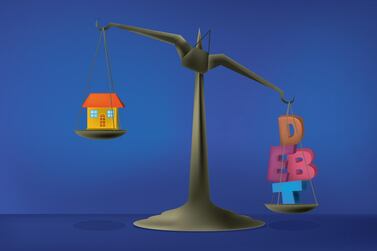Most people have debts, in one form or another – whether it's a credit card, mortgage or perhaps a car loan.
Yet at the same time, most of us also have savings and investments with cash in the bank, money in the stock market and maybe even a holding of cryptocurency. Is this rational, though?
Servicing capital and interest on your borrowings while trying to generate capital and interest on your savings seems to pull your finances in two different directions at once. So why not square the circle and simplify matters, by using your savings and any spare cash to clear those debts as soon as you can?
This isn't a new question. In many respects, it is one of the oldest questions investors have to address. And the answer is? Well, that depends on what debt you actually have.
Demos Kyprianou, a board member of SimplyFI, a non-profit community of personal finance and investing enthusiasts in Dubai, says if you owe money on a credit card, you could be paying interest of anything up to 40 per cent a year.
No investment on earth can generate that kind of return, and beware of anyone who claims theirs can.

Mr Kyprianou says you should therefore aim to pay off your credit cards in full before you start saving or investing.
Your money simply cannot work harder than it does when paying off expensive short-term debt like that. “Do not simply make the minimum repayment each month, clear it all as quickly as you can,” he says.
Georgina Howard, a chartered financial planner at The Fry Group, says if your credit card debt has built up to the point where you cannot pay it off quickly, try to speed up the process.
See if you can switch the debt to a credit card charging zero interest on balance transfers for an introductory period. “You may be astonished to see how quickly you can repay the balance you have transferred, compared to leaving it on your old card at a high APR,” she says.
Just remember that an interest-free introductory rate does not last forever. When it expires, your APR will soar. So make a note in your diary reminding you of the date this introductory period comes to an end, and clear the debt comfortably before then. This should be your financial priority.
Things get more complicated if you have less expensive debt, such as a car loan, says Ms Howard. "Most people are comfortable to start investing while still running a car loan, provided the monthly interest isn't too high," she adds.
The decision is even clearer when it comes to your mortgage. A home loan is the cheapest form of borrowing, and these days homeowners can get deals charging just 2 or 3 per cent.
That is way below the average return on the US S&P500 since 1957, which is around 8 per cent a year and Ms Howard says: “The stock market should comfortably outperform the cost of a mortgage, over the longer run.”
With the US Federal Reserve shocking markets by cutting interest rates by 50 basis points last Tuesday, and further cuts likely if the coronavirus panic deepens, you could soon have an opportunity to lock into a record low long-term rate, for at least five years.
If you do that, then you should have a clear idea of how much you can afford to invest every month, Ms Howard says. "You can then set aside money from your salary and add any lump sums from bonuses.”
Mortgage borrowing may be cheap, but do not get too relaxed about it. “You also have to make sure your mortgage debt is under control and you are on course to pay it off in good time,” says Ms Howard.
The decision over whether to prioritise paying off your mortgage is a personal one. More cautious investors will want to balance shareholdings with other assets such as bonds and cash, but there’s a downside. “This may reduce your average annual return and increase the danger of underperforming your mortgage rate after costs," Ms Howard says.
If you are a particularly risk-averse investor, you may prefer to overpay your mortgage instead. “There is comfort from knowing you are free of debt, whatever happens to markets,” she adds.
Stuart Ritchie, director of wealth advice at AES International, says most homeowners should use spare cash to invest rather than pay down their mortgage. “Your returns from a globally diversified portfolio of exchange traded funds (ETFs) with low annual management fees are likely to deliver a higher return than you will pay on your mortgage.”
Remember, a mortgage is an incredibly cheap way of borrowing money, Mr Ritchie adds, quoting billionaire US investor Warren Buffett, who said: “If I knew where I was going to live for the next five years or 10 years, I’d buy a home and I’d finance it with a 30-year mortgage. It’s a terrific deal.”
Mr Buffett made that pronouncement long before today's near-zero interest rates, so it arguably makes even more sense today.
However, your investment timescale will also determine your decision, Mr Ritchie says. “Nobody should really invest in the stock market unless they can leave their money there at least 10 years.”
Shares work best over many, many years, as this gives more time for share prices to rise and dividends compound, and claw back losses from any crash.
So the general rule is, pay down expensive short-term debt, then invest while also servicing your mortgage.
For those still torn between the two options, Mr Kyprianou sets a simple rule. “If you have any debts charging interest of more than 5 per cent a year, focus on paying that off first. Once the interest incurred falls below that, then you will do better by investing your money instead.”
There is one thing that almost nobody should be doing though, according to Professor Stephen Thomas, associate dean, MBA Programmes at Cass Business School in Dubai and London
“Think very carefully before you borrow to invest, even at today's low rates," he says. "The danger is that you can lose money for very long periods if stocks crash and take a long time to recover, which can happen.”
You should be particularly wary of borrowing to buy hyper-volatile investments, he adds. “Media hyped sure-fire winners such as cryptocurrency Bitcoin should be resisted at all costs.”
The average long-term return from shares may be higher than you would pay on a mortgage and the problem, says Mr Thomas, is that there is no guarantee you will actually get it.
The decision over whether to pay down debt or invest can be complex and is personal, but one rule applies to everyone. "Paying off your credit card is still the best investment you can make,” Mr Thomas says.








